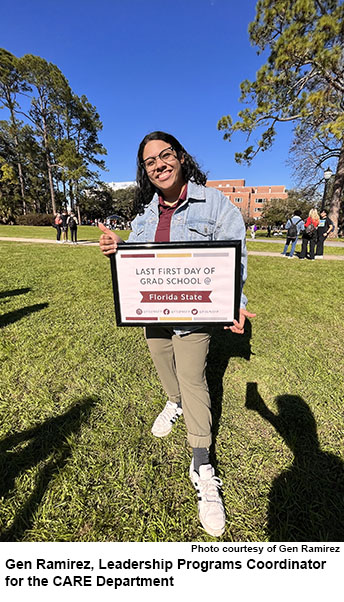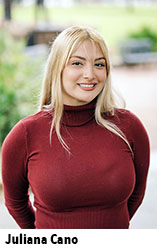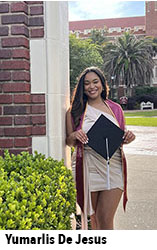Center for Academic Retention and Enhancement Department provides support, encouragement for first-generation students
By Arianna Bekas
Imagine entering college wearing a blindfold. You are in the dark and unaware of what is to come and how to navigate all components of college life.
Obviously, first-generation and minority students do not literally have on blindfolds on when they enter college, but their circumstances can sometimes act as a similar barrier.
The Center for Academic Retention and Enhancement (CARE) at Florida State University is committed to eliminating those blindfolds for all the first-year students who come from backgrounds traditionally underrepresented in higher education.
Gen Ramirez is the Leadership Programs Coordinator for the CARE Department, and she offers a bit more insight into the main mission of CARE.
“The main point of CARE is forming a place for those with marginalized backgrounds and those who have had disadvantages in their lives or their experiences,” says Ramirez, who has been in her position since May 2023, after two years of working as a graduate assistant. She earned her bachelor’s degree in psychology from FSU in 2020 and her Master of Science in higher education administration from FSU in 2023.
CARE offers various resources meant to provide support to students who need it most. Ramirez explains that as a department placed under both the Division of Student Affairs and Division of Undergraduate Studies, CARE is “at the center of everything” and hosts different outreach programs for the students involved.
“We host the Summer Bridge Program, which is the transition period between first-generation students who are coming into FSU straight out of high school,” she says.
The Summer Bridge Program began June 17 on FSU’s campus. Students live on campus during the Summer B semester and get a feel for what college life will be like for them in the fall. CARE Ambassadors, students who went through Summer Bridge themselves and are chosen and trained throughout the fall and spring semesters, help students throughout the duration of the experience.
“[CARE Ambassadors] each get a group of about 20 students,” Ramirez says. “From there they are their main mentor and guide throughout the seven-week program.”
Before the CARE Department became what it is now, at its creation in 1968 the program was known as Horizons Unlimited. Ten years later, in 1978, the Summer Enrichment Program came to fruition as a means to provide transitionary support to minority students as they acclimate to the change from K-12 classes to being enrolled at FSU.
In January 2000, FSU consolidated Horizons Unlimited, Multicultural Student Support Services, Minority Academic Programs, College Achievement, Multicultural Student Affairs, and the Summer Enrichment Program, creating the CARE Department and Summer Bridge.
Ramirez explains that additional programs, such as Quest Scholars, serve as additional opportunities for students who were unable to join the Summer Bridge activities to become involved with CARE during the ensuing fall semester.


 The scope of CARE, and support that the staff and volunteers provide, is thorough and comprehensive. (Please click on the individual images to read profiles of CARE students who are now at different stages of their college career, even as an FSU graduate.) The guidance ranges from the Unconquered Scholars Program, which is for students who have been in foster care or who were homeless youth, to Engage 100 Classes, an introduction to college life course taught by current students in CARE who are a part of their Outreach Team (O-Team).
The scope of CARE, and support that the staff and volunteers provide, is thorough and comprehensive. (Please click on the individual images to read profiles of CARE students who are now at different stages of their college career, even as an FSU graduate.) The guidance ranges from the Unconquered Scholars Program, which is for students who have been in foster care or who were homeless youth, to Engage 100 Classes, an introduction to college life course taught by current students in CARE who are a part of their Outreach Team (O-Team).
The O-Team members, as Ramirez explains, “not only help teach the Engage 100 class but they will also help give prospective students tours around FSU.”
The assistance CARE provides for students does not stop at the undergraduate level. The Bridge to Graduate School, run by FSU doctoral candidates, is a class students can take, and additional resources and services are provided to guide undergraduates as they continue their journey in higher education.
While classes and programs are the main role of the CARE Department, staff members also provide specialized help to the students.
“The CARE program offers financial literacy to students involved,” Ramirez says. “We help them with any questions about financial aid that they might have. We also have academic advising and college success coaching for students that are in their junior or senior year that need help. Students are assigned a college life coach to be a guide for them.”
Ramirez emphasizes that above all else is the community aspect of CARE.
“We are a little family,” she says proudly. “The CARE Department, and even the Thagard Building itself, is so family and community focused. That’s our most important thing, being there for each other and for our students, showing them that they do belong somewhere, and they belong here.”
Arianna Bekas is an English major on the editing, writing, and media track, with a minor in political science.
Follow the English department on Instagram @fsuenglish; on Facebook facebook.com/fsuenglishdepartment/; and Twitter, @fsu_englishdept
